Rural women rising
Empowering women farmers and bridging gender divides through climate-smart agriculture in southern Zimbabwe
With access to irrigated land, training in climate-resilient farming, and a platform to sell their produce, women farmers in Zimbabwe are forging new paths for economic independence and sustainable agriculture.
Elizabeth Dube, a 73-year-old smallholder farmer from Matabeleland South, delicately waters her crop as she reflects on the past: a time when she could not own land or sell farm produce at the market. These were simply liberties enjoyed by men.
With limited opportunities and without financial independence, life was challenging. At an age when many may consider retirement, Elizabeth remained the backbone of her family, raising eight grandchildren and working to support them.
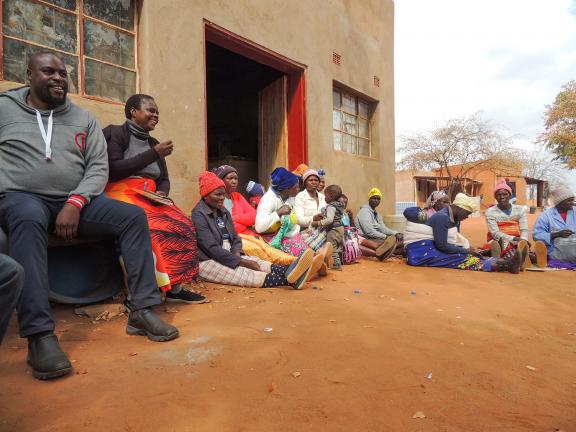
With most working-age men migrating to cities and neighbouring South Africa for work, women in rural areas manage farms, care for their families, and play a critical role in sustaining their communities. Photo: UNDP
“My four children moved out of my home, leaving me with eight grandchildren to care for. The oldest is 15 and the youngest is three years old.”
Today, Elizabeth owns a small piece of land and has access to a solar-powered irrigation scheme, a critical asset in a drought-prone region becoming increasingly dry due to climate change. With the income from the sale of cabbages, onions, maize, and wheat that she grows on her land, Elizabeth now has the means to send her grandchildren to school and put food on the table.
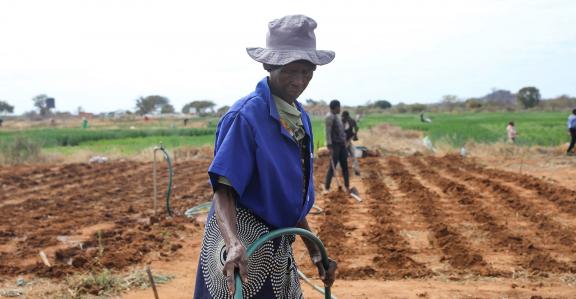
Elizabeth waters her crops with water from the community's new irrigation scheme. Photo: UNDP/Pylaia Chembe
Women at the forefront of the national economy
With a population of approximately 15 million people, Zimbabwe is one of the fastest growing economies in Africa. However, the country faces various climate, environmental, and socioeconomic crises threatening infrastructure, livelihoods, and food security.
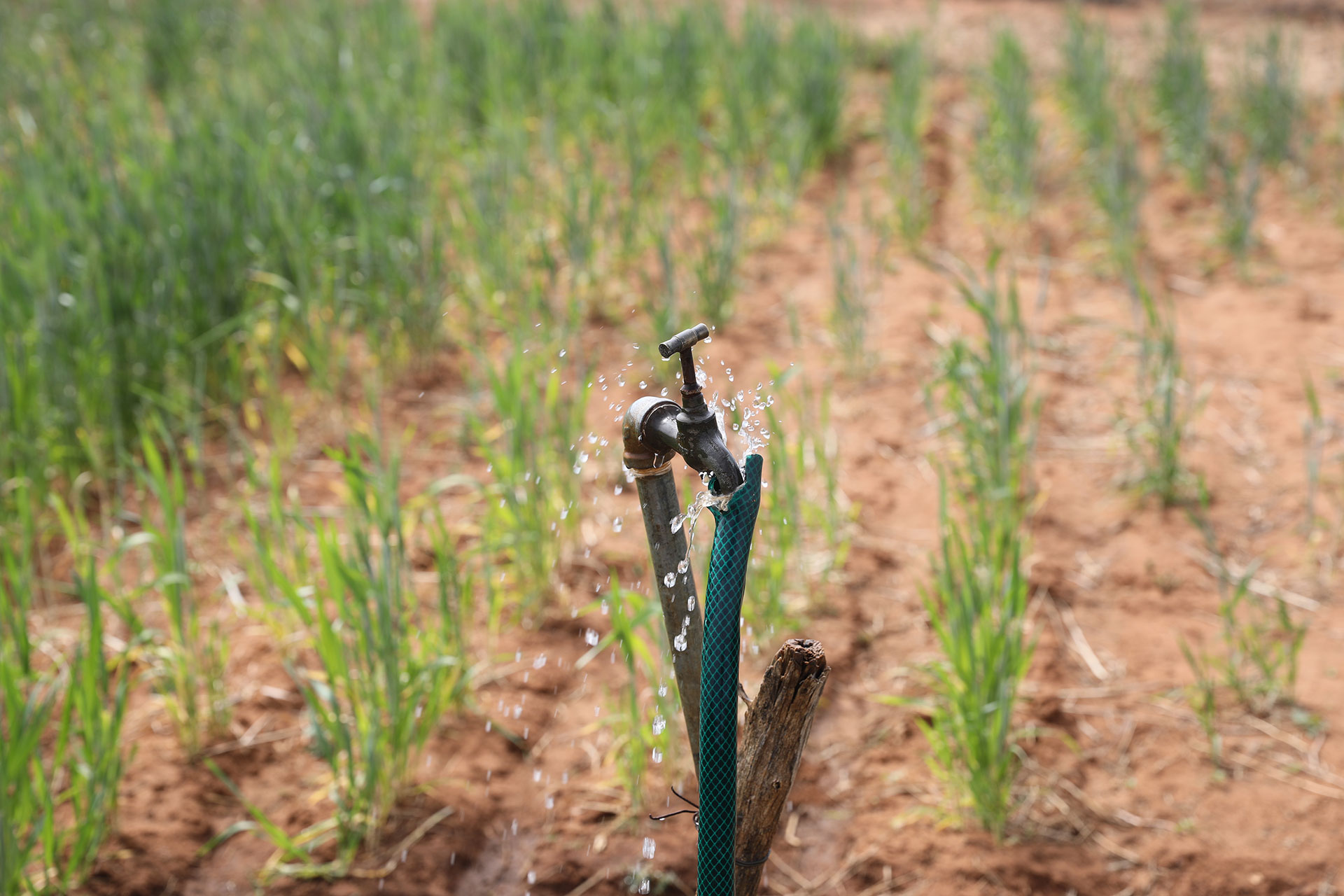
Photo: UNDP/Pylaia Chembe
Recognizing climate change as a severe threat to social and economic development, the Government of Zimbabwe is actively strengthening the resilience of agricultural livelihoods, particularly for women, impacted by the risks and impacts of climate change.
Zimbabwe has a total land area of 39 million hectares, with 33.3 million hectares used for agricultural purposes, which employs almost three-quarters of the population. Women are the champions of the sector, making up approximately 70 per cent of household labour and heading more than 40 per cent of households in rural communities.
Gender differences in property rights, access to climate information, credits, and loans make women particularly vulnerable to the impacts of climate change. Recurring drought and low rainfall negatively impact water supplies and fuel wood accessibility, increasing the distance women must travel to secure such resources. Women also remain marginalized in terms of adaptation strategies to cope with climate change impacts and minimal access to irrigation systems.
Challenging the gender divide with inclusive, climate-smart agriculture
The leading role of women on farms and in rural communities is reflected in a transformative US$26.6 million government-led project in southern Zimbabwe now underway in partnership with UNDP. Backed by the Green Climate Fund (GCF), the project will benefit 2.3 million rural smallholder farmers, mostly women in the vulnerable provinces of Manicaland, Masvingo, and Matabeleland South.
At the heart of the project is the recognition that women are essential agents of change rather than a vulnerable group in need of support. With this wisdom, the project supports women farmers, equipping them with the tools they need to prosper socially and economically.
Infrastructure
Twenty-one solar-powered irrigation systems are being installed under the project, ensuring a sufficient and reliable water source for crops and household use.
Banele Ncube, 37, notes, "Before the irrigation scheme was installed, our major challenge was lack of water. I would wake up very early to water my crops, but sometimes, the taps and hosepipes would not be enough for all of us. At times, I ended up going home without [water] and would have to come back even earlier the following day.” She hopes its capacity will be increased.
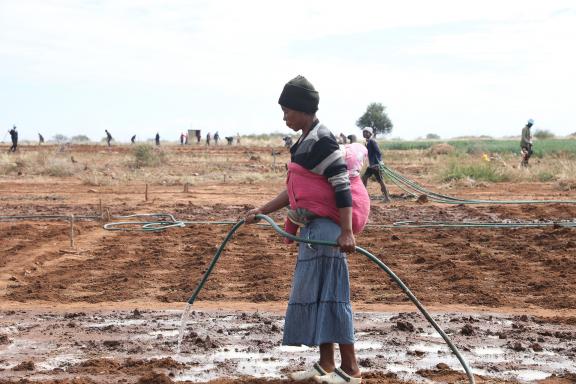
Banele Ncube, 37, has been caring for their three children alone. Like Elizabeth, whose land is opposite, she depends on the new irrigation scheme. Photo: UNDP/Pylaia Chembe
Irrigation Management Committees have been set up in association with each system installed. Almost half (46 per cent) of the committees' members are women holding strategic positions, including that of Chairperson, Treasurer, and Secretary, a 20 percent increase from baseline.
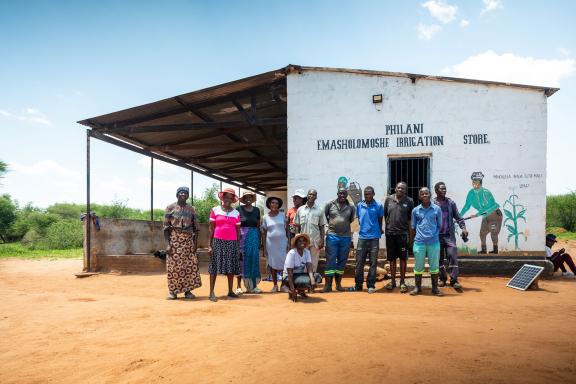
Masholomoshe Irrigation Management Committee, Gwanda Matebeleland South, 2023. Photo: UNDP/Anesu Freddy
“Since I became a part of my community’s Irrigation Management Committee, my husband and children respect me so much. I am now included in the decisions of my family, including being consulted by my husband’s family before making major decisions,” says Florence Ncingo, Vice Secretary of the Masholomoshe Irrigation Scheme.”
“My organization and planning skills have also improved through the trainings I have attended.”
Secretary of the Irrigation Scheme in Midlo, Ipithule Ndlovu, echoes this experience, saying men now come to her with inquiries concerning the scheme, a significant shift from past dynamics.
Knowledge
The government employs extension officers to work and communicate with farmers on smart water management, conservation agriculture, and climate-resilient production practices that consider increasing rainfall variability and dry spells. Now, more than 45,000 women farmers are practicing conservation agriculture through a combination of “minimum tillage,” which involves reducing the extent of soil disturbance during planting and mulching. The trainings are intended to help farmers transition from subsistence to commercial agriculture.

The project is disseminating climate information via SMS, radio, and WhatsApp, ensuring that even farmers in the hardest-to-reach areas can access the necessary information to inform their agricultural decisions. Photo: UNDP/Anesu Freddy
Beyond the farm
Elizabeth is optimistic for the future, positive her yields will only continue to increase, resulting in a strengthened capacity to fend for her family. While change takes time, the project is making incremental gains in empowering women farmers and narrowing gender gaps.
Traditionally marginalized in agriculture, women are now at the forefront of its transformation. They are adapting to climate challenges and driving economic empowerment and resilience for years to come.
Words: UNDP / GCF
Photos: UNDP